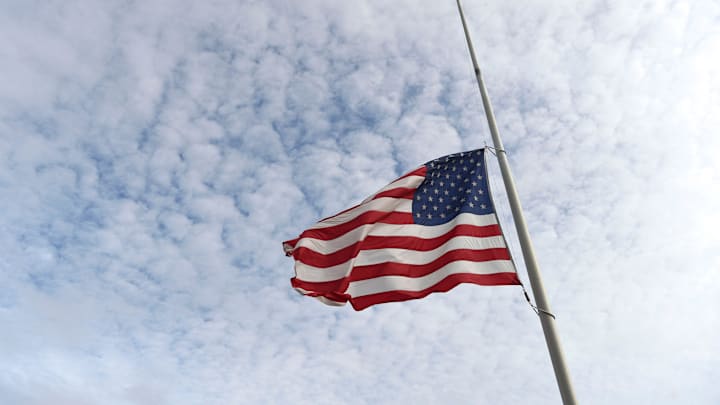How 9/11 Affected Razorback Sports' 2001 Football Season

A celebration to usher in the newly expanded and renovated Razorback Stadium was dampened by an area storm and the game was twice delayed by lightning.
Whatever enthusiasm remained with the largest crowd in Arkansas history of 70,470 was replaced by disappointment when No. 8 Tennessee rallied to score all its points in the final 9:44 to win 13-3.
As the Hogs licked their wounds and began preparations for the next game, a bigger problem arose three days later.
I was blissfully unaware of that morning's happenings when my cell phone rang. Was I watching TV? No, says I, but quickly turned on the big screen.
Shock.
Disbelief.
Numbness.
Nothing on TV had ever affected me like the devastating footage being shown on every channel in the United State and across the world. Graphic images of airplanes flying into the World Trade Center in the heart of Manhattan took our collective breath away.
When the monstrous towers — each reaching 110 stories into the sky above New York City — came crashing down, so did our nation's seemingly impenetrable sense of safety.
Life as we knew it was not to be the same.
President George Bush spoke to the nation that night as we watched TV again, to be comforted, in a way. Well before even Bush knew the full death count of 2,977, he said, in part: "These acts of mass murder were intended to frighten our nation into chaos and retreat. But they have failed; our country is strong."
Bush soon declared that life should go on as scheduled, that Americans shouldn't be deterred or scared by what had happened. He argued that we shouldn't let the terrorists win by cowering in fear or not living as normal.
The Southeastern Conference agreed. The games would go on. Until they didn't.
I had written a column agreeing with Bush; surely he spoke those words about carrying on bravely before I wrote them but memories fade after 23 years.
Major league baseball had canceled games on September 11 and then extended the ban for the next three days. Others were to follow suit.
On Thursday, sentiment changed for SEC officials. It was just two days after the terrorist attacks that included a plane hitting the Pentagon and takeover of another plane which crashed in Pennsylvania before it could reach the White House or the Capitol.
The NFL declared it would not play that Sunday. College football quickly followed suit and postponed that week's games. Many people — including some I talked to at Arkansas — weren't in the mood for business as usual. The nation needed time to mourn, to recover.
Plus, nobody knew how safe it would be to fly. For five days, all planes (except for military) were grounded in the U.S. Nobody knew if the stadiums would be safe. Nobody knew much of anything.
Lots of safety precautions were put in place at airports and stadiums that remain in effect today. Life got more complicated but safety became a priority over convenience.
For the folks older than me, some of the overwhelming emotions experienced on 9/11 and after were similar to when President John F. Kennedy was assassinated. There was immediate speculation that he'd been killed by foreign agents, either Russian or Cuban, or some other group that might've included the mafia or government agencies. Shock and sadness overwhelmed the country.
A week after the 9/11 attack, the SEC, NFL and the country at large were ready to resume activities. The Razorbacks traveled to Alabama and lost 31-10 and flew to Georgia the next week and lost 34-23 before winning six straight.
Four of those wins were at their remodeled home on campus, with one in Little Rock and the other that amazing seven-overtime thriller at Ole Miss that resulted in a 58-56 Arkansas victory.
The Hogs ended the regular season at 7-4 and faced Oklahoma in the New Year's Day Cotton Bowl in Dallas. The weather was ghastly with a temperature of 36 degrees and wind chill in the 20s (thank goodness media sits in the warm press box!). OU scored a touchdown in the first quarter and won 10-3 as the teams combined for just 17 first downs.
It was a ho-hum finish to a football season that was marred by one of the most surprising and tragic days in our nation's history.
HOGS FEED:
• UAB's Dilfer praises Petrino as 'puppet master' among offensive minds
• SEC struggles have no bearing on Razorbacks
• Hiring Bobby Petrino Solved One Key Issue for Razorbacks
• Subscribe and follow us on YouTube
• Follow HogsSI on X and Facebook
